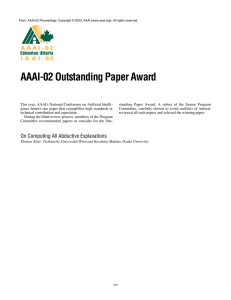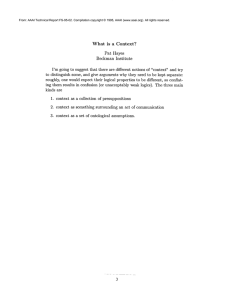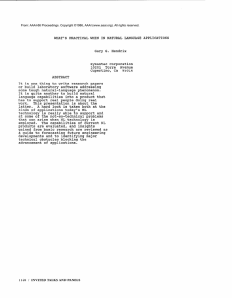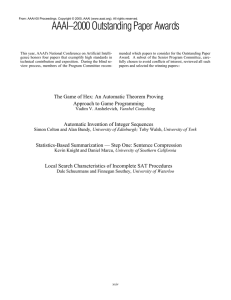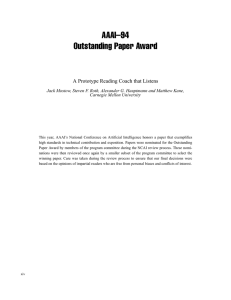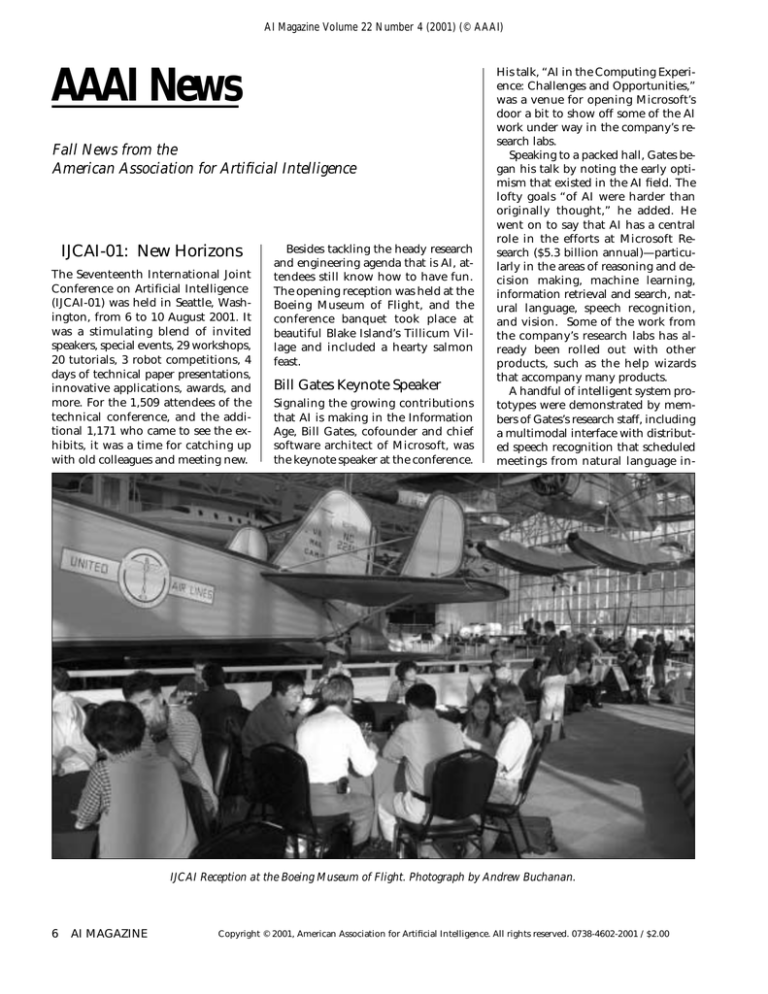
AI Magazine Volume 22 Number 4 (2001) (© AAAI)
AAAI News
Fall News from the
American Association for Artificial Intelligence
IJCAI-01: New Horizons
The Seventeenth International Joint
Conference on Artificial Intelligence
(IJCAI-01) was held in Seattle, Washington, from 6 to 10 August 2001. It
was a stimulating blend of invited
speakers, special events, 29 workshops,
20 tutorials, 3 robot competitions, 4
days of technical paper presentations,
innovative applications, awards, and
more. For the 1,509 attendees of the
technical conference, and the additional 1,171 who came to see the exhibits, it was a time for catching up
with old colleagues and meeting new.
Besides tackling the heady research
and engineering agenda that is AI, attendees still know how to have fun.
The opening reception was held at the
Boeing Museum of Flight, and the
conference banquet took place at
beautiful Blake Island’s Tillicum Village and included a hearty salmon
feast.
Bill Gates Keynote Speaker
Signaling the growing contributions
that AI is making in the Information
Age, Bill Gates, cofounder and chief
software architect of Microsoft, was
the keynote speaker at the conference.
His talk, “AI in the Computing Experience: Challenges and Opportunities,”
was a venue for opening Microsoft’s
door a bit to show off some of the AI
work under way in the company’s research labs.
Speaking to a packed hall, Gates began his talk by noting the early optimism that existed in the AI field. The
lofty goals “of AI were harder than
originally thought,” he added. He
went on to say that AI has a central
role in the efforts at Microsoft Research ($5.3 billion annual)—particularly in the areas of reasoning and decision making, machine learning,
information retrieval and search, natural language, speech recognition,
and vision. Some of the work from
the company’s research labs has already been rolled out with other
products, such as the help wizards
that accompany many products.
A handful of intelligent system prototypes were demonstrated by members of Gates’s research staff, including
a multimodal interface with distributed speech recognition that scheduled
meetings from natural language in-
IJCAI Reception at the Boeing Museum of Flight. Photograph by Andrew Buchanan.
6
AI MAGAZINE
Copyright © 2001, American Association for Artificial Intelligence. All rights reserved. 0738-4602-2001 / $2.00
AAAI News
put, a dependency network that can
analyze user patterns (for example, user TV-watching patterns from a
Nielsen database, MSNBC web site
traffic), a web document-retrieval system, and an e-mail notification manager that sorts e-mails from multiple
sources and devices to give the user
the correct information at the correct
time and place. No product announcements were made in connection with
these demonstrations, but it is safe to
conclude that some of these functions
will likely be bundled in future Microsoft product offerings.
Gates concluded by saying he was
“optimistic” about AI because “advances are happening at a rapid pace.”
Taking Stock of AI
Advances in a number of AI subfields
are moving quickly indeed—but just
how quickly?
David Stork of Stanford University
and the Ricoh California Research
Center gave a soul-searching, indepth talk entitled “The HAL 9000
Computer and the Vision of 2001: A
Space Odyssey” that compared the vision of AI in Stanley Kubrick’s film
with the reality of AI’s progress to
date. Stork critiqued each of HAL’s capabilities—from speech and chess
playing to affective computing and
common sense—and compared them
with today’s state-of-the-art research
efforts. Stork spent some time describing the research that Kubrick and
Clark did to make the movie and
showed video clips of the research
projects the movie’s creators saw as
they prepared the script. Although
there was still quite a gap between the
visions of Kubrick and Clark and today’s AI capabilities, there has clearly
been significant progress since the
late 1960s. Stork ended by encouraging the AI community to a “renewed
effort to fulfill the vision of 2001: A
Space Odyssey.”
Robot Competitions
Although no HAL-like machines were
on hand, the main exhibition hall in
Seattle was filled with robot competitions, showcasing this year’s crop of
robots. The competitions included
■ RoboCup soccer competition for virtual,
small, and medium robot teams
2001 Innovative Applications
of AI (IAAI-01) Winners
Deployed Application Winners
■ U.S. Marine Corps (U.S.)—Transportation logistics planning and
scheduling system
■ Australian Defence Force (Australia)—Intelligent agent military simulation system
■ Wyoming Department of Agriculture (U.S.)—Advisory system for
grasshopper infestation management
■ Jet Propulsion Laboratory (U.S.)—NASA science mission planning system
for a radar satellite over Antarctica
■ IBM T.J. Watson Research Center (U.S.)—Web-based natural language
sales assistant
Emerging Application Winners
■ Ontario Cancer Institute (Canada)—Integration of case-based reasoning
with image analysis for high-throughput protein crystallization in the
laboratory
■ University of Illinois at Urbana/Champaign (U.S.)—Context-sensitive
text corrector that fixes spelling errors
■ Kyushu University (Japan)—Intelligent agent system with automated
learning and adapting for personalized web searching
■ University of New Hampshire (U.S.)—Constraint-based system for diagnosis of interoperability problems in asynchronous transfer mode networks
■ University of Southern California Information Sciences Institute and
Computer Science Department (U.S.)—”Electric elves” (agents) that support routine office tasks (for example, scheduling meetings) across a variety of office machines and communication devices
■ ENAC/LOG and CENA/LOG (France)—In-the-air flight-control system
■ Thales/LCR (France)—Multidomain information-extraction system
■ Mobile Robot Competition and Exhibition for medium and large robots
■ Botball Tournament for robots built by
middle and high school students. Fortyseven teams competed this year.
Innovative Applications
The Thirteenth Annual Conference
on Innovative Applications of AI
(IAAI-01) was once again a showcase
for some recent stellar AI systems
that are making a difference. A wide
array of deployed and emerging applications were honored this year
(see sidebar).
Standing back and examining
progress through two decades of
AAAI-sponsored conferences, it is
clear that AI is a strong and diverse
field of science and engineering. Not
only is it already making a myriad of
vital contributions in industry, government, and our everyday lives, but
it holds great promise in the near future and beyond.
The IJCAI-01 proceedings are available from Morgan Kaufmann Publishers (www.mkp.com) and the
IAAI-01 proceedings are available
from AAAI Press (www.aaaipress.org).
Audiocassette tapes of many of the
talks are also available from Audio
Archives International (audioarc@
flash.net).
– Sara Hedberg
WINTER 2001 7
AAAI News
AAAI Fellows
Nominations Solicited
The 2002 Fellows Selection Committee is currently accepting nominations
for AAAI Fellow. The AAAI Fellows
program is designed to recognize people who have made significant, sustained contributions to the field of artificial intelligence over at least a ten
year period. All regular members in
good standing are encouraged to consider nominating a candidate. Two references (at least one from a current
AAAI Fellow) must accompany nominations. For further information about
the Fellows Program or to receive
nomination and reference forms,
please contact AAAI at 650-328-3123;
by fax at 650-321-4457; or by email at
fellows@aaai.org. Nomination materials are also available on our web site.
The deadline for nominations is
February 15, 2002.
AAAI Awards Program
AAAI is pleased to announce the continuation of its Awards program in
2002. The AAAI Awards include the
following:
The Classic Paper Award
This award honors the author(s) of paper(s) deemed most influential, chosen
from a specific conference year. The
2002 award will be given to the most
influential paper(s) from the Third National Conference on Artificial Intelligence (AAAI-83), Washington, DC. A
listing of these papers is available at
www.aaai.org/Press/Proceedings/AAAI/
aaai-proceedings.html. AAAI members
can access full text of the papers in the
online Member’s Library. All members
of the artificial intelligence community are encouraged to submit nominations for this award. Candidacy is not
limited to AAAI members or to people
still active in artificial intelligence.
Posthumous awards will be considered.
The Distinguished
Service Award
This award recognizes one individual
for extraordinary service to the AI
community. Areas of service could include, but are not limited to: society
8
AI MAGAZINE
service, service as an editor, conference organizer, representative of AI in
other organizations (e.g. CRA, ACM,
IEEE), or influential service as a government agency contract monitor or
program director, resulting in positive
effects on the field of AI. Nominees
must be current members of AAAI. All
regular members of AAAI are encouraged to place an individual’s name in
nomination.
The Effective Expository
Writing Award
This award honors the author(s) of a
high quality, effective piece of writing,
accessible to the general public or to a
broad AI audience (not just a subarea),
written within the last two years. The
contribution should be based on
sound science, interesting ideas or systematic review, with non-trivial content, but the award is primarily for the
exposition—the author need not be
the one who has done the research.
Nominated papers must be in English
and must have been published in a
publicly accessible place (e.g., periodical, hard copy or online journal, but
not only as a web site or technical report). All regular members of AAAI are
encouraged to nominate a candidate.
All awards will be presented at
AAAI-02 in Edmonton, Alberta, Canada, and will include a certificate and
$2,500. Complete nomination information, including nomination forms,
is available at www.aaai.org/ Awards/
awards.html. The deadline for nominations is March 15, 2002. For additional inquiries, please contact Carol
Hamilton at hamilton@aaai.org.
AAAI-02
Mark your calendars now for AAAI-02!
The Eighteenth National Conference
on Artificial Intelligence (AAAI-02)
will be held July 28 – August 1 at the
Shaw Convention Center in Edmonton, Alberta, Canada. This is the first
AAAI to be held outside of the continental United States, and we hope you
will venture north to join us in Edmonton. Several events will be collocated with AAAI-02, including the following:
■ Fourteenth Conference on Innovative
Applications of Artificial Intelligence
(IAAI-02)
July 30 – August 1
www.aaai.org/Conferences/IAAI/2002/i
aai02.html
■ CanDB
July 22
■ Third International Conference on
Computers and Games
July 25–27
■ International Database Engineering and
Applications Symposium (IDEAS’02)
July 17–19
■ Tenth Annual Conference on Intelli-
gent Systems for Molecular Biology
(ISMB 2002)
August 3–7
■ The Eighth ACM SIGKDD International
Conference on Knowledge Discovery
and Data Mining (KDD-2002)
July 23–26
■ Symposium on Abstraction, Reformula-
tion and Approximation (SARA 2002)
Kananaskis Mountain Lodge, Kananaskis, Alberta, Canada
August 2-4
■ Association for Uncertainty in Artificial
Intelligence (UAI ‘02)
August 1-4
The national conference will have a
very different structure in 2002. Instead of several parallel sessions, the
conference will revolve around one
plenary session of invited talks and selected technical paper presentations,
as well as 2-3 poster sessions to showcase all the technical papers. For more
information about this experiment,
please see the letter from the program
chairs (see sidebar on next page).
Several regular programs will return
to AAAI in 2002, including the tutorial
forum, workshops, exhibits, the SIGART/AAAI Doctoral Consortium, the
Student Abstract and Poster Program,
the Intelligent Systems Demonstrations, the AAAI Mobile Robot Competition and Exhibition, the Robot
Building Lab, and representatives from
the National Botball Competition.
Please check the AAAI-02 web site
(www.aaai.org/Conferences/National/2002/aaai02.html) for all the details
and deadlines for these programs, as
well as announcements about other
new features.
A few important deadlines to note
on your calendar:
■ January 21, 2002: AAAI-02 Electronic title page, abstract, and paper submission deadline
AAAI News
January 22, 2002: AAAI-02 Hardcopy paper submission deadline
■ January 22, 2002: IAAI-02 Submission Deadline
■ February 11, 2002: SIGART/AAAI
Doctoral Consortium application
deadline
■ March 15, 2002: AAAI-02 Notifications to authors
■ April 9, 2002: Deadline for receipt
of camera-ready copy
Information about the conference is
also available by writing to ncai@
aaai.org.
■
AAAI-02
Workshop Program
The following 19 workshops have
been chosen for inclusion in the AAAI02 Workshop Program. The workshops
will be held Sunday and Monday, July
28-29 in Edmonton, Alberta, Canada.
Please consult the AAAI-02 web site for
more information regarding schedules
and guidelines for participation. The
chair of the AAAI-02 Workshop Program is Berthe Chouiery at Peter van
Beek at the University of NebraskaLincoln (choueiry@cse.unl.edu).
■ Agent-Based B2B Electronic Commerce
Technologies. Brian Blake (blakeb@
cs.georgetown.edu, bblake@mitre.org)
■ Agent-Based Systems for Information Re-
trieval. R. Scott Cost (cost@csee.umbc.
edu), Charles Nicholas (nicholas@csee.
umbc.edu), and Ian Soboroff (isoboroff@rogue.ncsl.nist.gov)
■ Artificial Intelligence for Intelligent Busi-
ness. Daniel E. O’Leary (oleary@usc.
edu), Benjamin Grosof (bgrosof@
MIT.edu), and Alun Preece (apreece@
csd.abdn.ac.uk)
■ Automation as Caregiver: The Role of In-
telligent Technology in Elder Care. Karen
Haigh (khaigh@htc.honeywell.com)
■ Autonomy, Delegation, and Control: From
Inter-agent to Groups. Henry Hexmoor
(hexmoor@mail.uark.edu) and Rino Falcone (falcone@www.ip.rm.cnr.it)
■ Coalition Formation in Dynamic Multia-
gent Environments. Leen-Kiat Soh (lksoh@cse.unl.edu) and Charlie Ortiz (ortiz@ai.sri.com)
■ Cognitive Robotics (CogRob2002). Chitta
Baral (chitta@asu.edu) and Sheila McIlraith (sam@ksl.stanford.edu)
■ Game Theoretic and Decision Theoretic
Agents. Piotr Gmytrasiewicz (piotr@
cs.uic.edu) and Simon Parsons
Dear AAAI Member,
We would like to draw your attention to the Call for Papers for AAAI-2002, available on the web at www.aaai.org/Conferences/National/2002/aaai02.html.
In the hope of making the meeting as exciting and stimulating as possible, we will
be experimenting this year with a new format. As the national conference for all
AI, AAAI-2002 should play a centralizing and unifying role that complements
more specialized meetings. We would like the papers submitted and presented
to be meaningful to and accessible to the whole AI community. To this end, in
AAAI-2002 we will eschew multiple parallel sessions in favor of a single plenary
track. All accepted papers will be presented as posters in two high-profile evening
sessions, and a subset of these will also be presented orally in a plenary track
during the day. All papers will appear identically in the proceedings, and all will
be subject to the same rigorous review process. Invited talks will also be part of
the plenary track. To fit in as many orally presented papers as possible, we will
extend the AAAI-2002 technical program to a full three days.
As a potential author, we hope this new format will encourage you to submit your
best work to AAAI-2002, and to describe it in a way that makes it broadly accessible. The new format will give your work the widest possible exposure to the
AI community. In particular, other meetings in other fields have shown that the
kind of poster sessions we are planning—with a prominent dedicated time slot
and food being served—can be a very effective and highly respected means of
presentation. Based on feedback from attendees, AAAI will decide whether to
continue with this format, modify it, or return to the old.
Most of all, the new format is intended to make the conference more rewarding
for attendees. Please join us in beautiful Edmonton next summer and participate
in this experiment in AI.
Rich Sutton, Rina Dechter, and Michael Kearns
Program Cochairs
(S.D.Parsons@elec.qmw.ac.uk)
■ Intelligent Integration of Information and
Services on the Web. Dean Allemang
(dallemang@acm.org), Eleni Stroulia
(stroulia@cs.ualberta.ca), and John Mylopoulos (jm@cs.toronto.edu)
■ Intelligent Situation-Aware Media and Pre-
sentations (ISAMP). Rainer Malaka
(malaka@eml.org) and Antonio Krüger
(krueger@cs.uni-sb.de)
■ Meaning Negotiation. Paolo Bouquet
(bouquet@cs.unitn.it)
■ Multi-Agent Modeling and Simulation of
Economic Systems (MAES). Koichi Kurumatani (kurumatani@w-econ.org), ShuHeng Chen (chchen@nccu.edu.tw), and
Azuma Ohuchi (ohuchi@complex.eng.
hokudai.ac.jp)
■ Ontologies for the Semantic Web. Adam
Pease (apease@ks.teknowledge.com),
Richard Fikes (fikes@ksl.stanford.edu),
and Jim Hendler (hendler@cs.umd.edu)
■ Planning with and for Multiagent Systems.
Michael Brenner (brenner@informatik.uni-freiburg.de) and Subbarao
Kambhampati (rao@asu.edu)
■ Preferences in AI and CP: Symbolic Ap-
proaches. Ulrich Junker (junker@ilog.fr)
■ Probabilistic Approaches in Search. Carla
Gomes (gomes@cs.cornell.edu) and Toby Walsh (tw@cs.york.ac.uk)
■ Real-Time Decision Support and Diagnosis
Systems. Haipeng Guo
(hpguo@cis.ksu.edu), Eric Horvitz
(horvitz@microsoft.com), William H.
Hsu (bhsu@cis.ksu.edu), and Eugene
Santos Jr. (eugene@cse.uconn.edu)
■ Semantic Web Meets Language Resources.
Nancy Ide (ide@cs.vassar.edu) and Chris
Welty (welty@cs.vassar.edu)
■ Spatial and Temporal Reasoning. Hans W.
Guesgen (hans@cs.auckland.ac.nz),
Frank D. Anger (fanger@nsf.gov), and
Gerard Ligozat (ligozat@limsi.fr)
WINTER 2001 9
AAAI News
student poster program. Application
packages are due at the AAAI office by
February 11, 2002. The 2002 Doctoral
Consortium Chair is Marie desJardins
(mariedj@cs.umbc.edu).
Student Scholar and
Volunteer Program
IJCAI Keynote Speaker Bill Gates. Photograph by Andrew Buchanan.
AAAI-02 Student Abstract
and Poster Program
AAAI/ SIGART Doctoral
Consortium
AAAI-02 invites submissions to the
student abstract and poster program.
The goal of this program is to provide
a forum in which students can present
and discuss their work during its early
stages, meet some of their peers who
have related interests, and introduce
themselves to more senior members of
the field. The program is open to all
pre-Ph.D students. Nonstudent advisors or collaborators should be acknowledged appropriately, as coauthors or otherwise. However, students
are requested to honor the spirit of the
program by submitting only work for
which they are primary investigators.
Accepted abstracts will be allocated
two (2) pages in the conference proceedings, and will be allocated presentation time and space in the student
poster display area at the conference.
Submissions are due January 25,
2002. For more information, please see
the Call for Participation at www.
aaai.org/Conferences/National/2002/a
aai02.html. Student Abstract and
Poster Program Cochairs are Mark
Craven (craven@biostat.wisc.edu) and
Sven Koenig (skoenig@cc.gatech.edu).
AAAI and ACM/SIGART invite students to apply for the Seventh
AAAI/SIGART Doctoral Consortium.
The Doctoral Consortium (DC) provides an opportunity for a group of
Ph.D. students to discuss and explore
their research interests and career objectives with a panel of established researchers in Artificial Intelligence.
The consortium has the following
objectives: (1) to provide a setting for
mutual feedback on participants’ current research and guidance on future
research directions; (2) to develop a
supportive community of scholars and
a spirit of collaborative research; (3) to
support a new generation of researchers with information and advice
on academic, research, industrial, and
non-traditional career paths; and (4)
to contribute to the conference goals
through interaction with other researchers and participation in conference events.
The Doctoral Consortium will be
held as a workshop on July 28-29,
2002, immediately before the start of
the main conference. Participants will
also present their work at the AAAI-02
10
AI MAGAZINE
AAAI is pleased to announce the continuation of its Student Scholar and
Volunteer Programs. The Student
Scholar Program provides partial travel support and a complimentary technical program registration for students
who are full-time undergraduate or
graduate students at colleges and universities; are members of AAAI; submit
papers to the technical program or letters of recommendation from their
faculty adviser; and submit scholarship applications to AAAI by April 15,
2002. In addition, repeat scholarship
applicants must have fulfilled the volunteer and reporting requirements for
previous awards.
In the event that scholarship applications exceed available funds, preference will be given to students who
have an accepted technical paper, and
then to students who are actively participating in the conference in some
way. However, all eligible students are
encouraged to apply.
After the conference, an expense report will be required to account for the
funds awarded. For further information about the Scholarship Program,
or to obtain an application, please
contact AAAI at scholarships@aaai.
org, or 445 Burgess Drive, Menlo Park,
CA 94025. Telephone: (650) 328-3123.
All student scholarship recipients
will be required to participate in the
Student Volunteer Program to support
AAAI organizers in Edmonton, Alberta, Canada. The Volunteer Program is
an essential part of the conference and
student participation is a valuable
contribution. Students not requiring
travel assistance should only apply for
the Volunteer Program, which provides complimentary registration to
full-time students, including conference proceedings, in exchange for assisting AAAI-02 organizers in Edmonton. This program does not provide
any scholarship funds, and is designed
for local students or students who
AAAI News
have other sources for travel funds.
AAAI membership is required for eligibility. For further information regarding the Student Volunteer Program,
please contact AAAI at volunteer
@aaai.org. The deadline for volunteer
applications is May 31, 2002.
2002 Spring
Symposium Series
The 2002 Spring Symposium Series
will be held March 25-27, 2002 at
Stanford University and will feature
nine symposia on the following subjects:
■ Acquiring (and Using) Linguistic
(and World) Knowledge for Information Access
■ Artificial Intelligence and Interactive Entertainment
■ Collaborative Learning Agents
■ Information Refinement and Revision for Decision Making: Modeling for Diagnostics, Prognostics,
and Prediction
■ Intelligent Distributed and Embedded Systems
■ Logic-Based Program Synthesis:
State of the Art and Future Trends
■ Mining Answers from Texts and
Knowledge Bases
■ Safe Learning Agents
■ Sketch Understanding
Registration materials have been
mailed to all AAAI members and to invited participants. They are also available on the AAAI web site. Please note
that the deadline for registration for
invited participants is February 15 and
the general registration deadline is
March 1.
NEW!! AI ALERT
Newsletter
Many of you have been receiving the
AI ALERT electronic newsletter. This
new service keeps you informed of
what is being written on AI in the
press within the past few weeks. If you
would like to receive this newsletter,
please write to us at membership@
aaai.org for instructions on how to
subscribe to the AAAI members email
list. We also welcome your feedback
on the newsletter at aitopics@aaai.org.
Be sure to visit the AI Topics web site at
Alan Alda and Manuela Veloso watch a RoboCup Match.
Photography by Andrew Buchanan.
www. aaai.org/AITopics/aitopics.html.
Member News
On India’s Republic day celebrated
January 26, the President of India conferred one of the highest national
awards, Padma Bhushan, on Raj Reddy, Herbert A. Simon University Professor of Computer Science and
Robotics in the School of Computer
Science at Carnegie Mellon University,
for his outstanding contributions in
computer science and information
technology. Reddy is a fellow and former president of AAAI. The award was
presented this spring by the President
of India in New Delhi.
The Centre for Intelligent Systems
and their Applications (CISA) was created in August 2001 from two worldleading groups at the University of Edinburgh. These groups focus on basic
and applied research in Artificial Intelligence (AI), with members engaged in
undergraduate, postgraduate and continuing education. Formed within the
Division of Informatics, CISA will
unite the Artificial Intelligence Applications Institute (AIAI) and the Institute for Representation and Reasoning
(IRR). CISA is to be engaged in R&D involving knowledge representation and
reasoning, planning, acting, cooperation, adaptive systems and intelligent
agents. Through AIAI, the Centre will
work with others in industry and elsewhere to develop and deploy applications of these technologies. For more
information, please contact Austin
Tate at a.tate@ed.ac.uk.
The Cork Constraint Computation
Centre has been established at University College Cork, Ireland, with initial
funding from a Science Foundation
Ireland Principal Investigator award to
Eugene Freuder of 5 million Irish
pounds (approximately 5.8 million
dollars). Freuder moved to University
College Cork in fall, 2001 to become
Science Foundation Ireland Research
Professor.
AAAI Fellow Jon Doyle has been appointed SAS Institute Distinguished
Professor of Computer Science in the
College of Engineering at North Carolina State University, effective August
2001, through an endowment from
SAS Institute Inc. and the University
of North Carolina General Administration.
WINTER 2001 11
AAAI News
12
AI MAGAZINE

